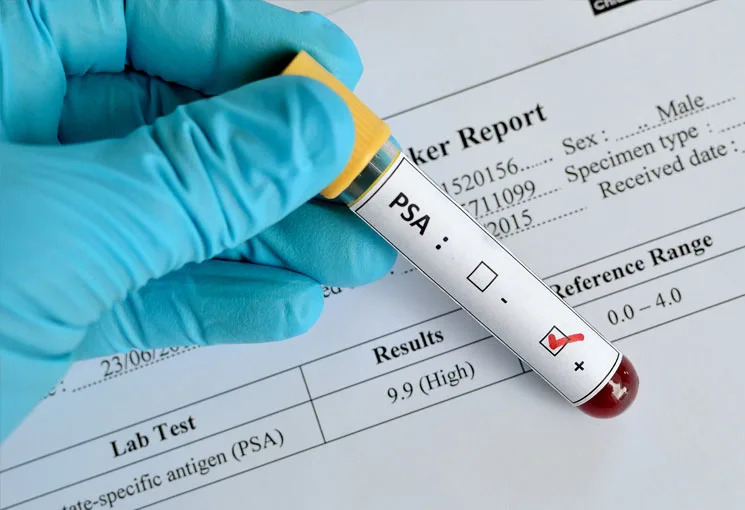Preventive Healthcare
What Is the PSA Test and What Do PSA Levels Mean?

Table of Contents
- What is PSA (Prostate Specific Antigen)?
- What is The PSA Test?
- What are The Symptoms That Warrant a PSA Test?
- Factors That Affect PSA Levels
- What is The Next Step if You Have a High PSA Level?
- How Do I Prepare for a PSA Test?
- What is The Procedure for The Prostate-Specific Antigen Test?
- How is a PSA Test Administered?
- Why is The PSA Test Done?
- What is The Cost of a PSA Test?
- How is Prostate-Specific Antigen Measured?
- What Does The PSA Test Result Mean?
What is PSA (Prostate Specific Antigen)?
PSA or Prostate-specific antigen is a protein that is produced by the prostate gland in response to inflammation. PSA levels vary naturally throughout the life cycle of a man and maybe high even in men who don’t have prostate cancer and have conditions like benign prostatic hyperplasia (BPH), which is an enlargement of the prostate gland due to obstruction of the flow of urine. However, high PSA levels may also be associated with prostate cancer.
What is The PSA Test?
The full name of the PSA test is prostate-specific antigen test. The Prostate-Specific Antigen test is a simple blood test that helps measure the level of PSA in the blood. It helps diagnose high levels of PSA, which could be a sign of:
- prostate cancer
- enlarged prostate or benign prostatic hyperplasia (BPH)
- prostatitis, or inflammation in the prostate gland
PSA occurs in two forms in the body—it is either attached to certain blood proteins or is present as free PSA. Your doctor may recommend getting a free PSA test in conjunction with the total PSA test to get a better understanding of the cause of the PSA elevation.
What are The Symptoms That Warrant a PSA Test?
The following symptoms may indicate some prostate issues, and your doctor may give you a PSA test to help with the correct diagnosis and treatment:
- Urinary frequency
- Painful urination
- Blood in the urine or semen
- Urinary urgency or incontinence
- Pelvic/back pain
Factors That Affect PSA Levels
Many factors affect PSA levels, including age, race, and health habits. However, the most important factor is a man's prostate size. A healthy man with a small prostate will have a low PSA level, while a man with a large prostate will have a high level.
Understanding PSA Levels
PSA levels are measured in nanograms per millimeter, or ng/mL. Here are four likely outcomes of the test and inferences you can draw from them:
- For men who have PSA levels between 0 and 2.5 ng/mL, prostate cancer is highly unlikely. At this stage, the chances of developing cancer are low, and further testing is generally not required.
- For men who have PSA levels of between 2.5 and 4.0 ng/mL is considered to be in the normal range. So, if you are not exhibiting other risk factors, if your PSA levels are stable, and if you aren’t administering BPH medication, your doctor may rule out additional testing. You can retake the test after a while, as directed by your physician.
- Your doctor might ask for additional tests to check for other benign conditions if PSA levels are higher than 4.0 ng/mL. For instance, high PSA levels could be a sign of a urinary tract infection.
- PSA levels of 10 ng/mL or higher are a cause for concern. At this stage, the probability of having prostate cancer is quite high.
Normal PSA Levels By Age
As mentioned earlier, PSA levels increase with age due to the natural growth of the prostate gland. A physician will therefore take your age into account when examining your PSA levels.
- For patients between the ages of 40 and 50 years, PSA levels of between 0 and 2.5 ng/mL are considered normal.
- For patients between the ages of 50 and 60, PSA levels of between 0 and 3.5 ng/mL are acceptable.
- For patients between the ages of 60 and 70, PSA levels of 0 to 4.5 ng/mL are average.
- For patients between the age of 70 and above, PSA levels of between 0 and 6.5 ng/mL are considered normal.
What Do High Levels of PSA Mean?
PSA (prostate-specific antigen) levels of 4 to 10 or higher can be indicative of any of the following:
- Prostate cancer
- Enlargement of the prostate (benign prostatic hyperplasia)
- Inflammation of the prostate (prostatitis)
- Urinary tract infection
Men with prostate cancer commonly have a higher PSA level, though it is not unusual to find normal levels of PSA in men diagnosed with prostate cancer. Thus, it is not a confirmatory test for cancer.
The percentage of free PSA helps distinguish between BPH and prostate cancer. A free PSA of 20% or greater is suggestive of BPH, whereas a free PSA value of 10% or less indicates a greater likelihood of having prostate cancer.
What is The Next Step if You Have a High PSA Level?
If your PSA test results show an elevated level, your doctor will likely conduct some more investigations to reach a confirmatory diagnosis. These may include:
- A repeat PSA test is necessary to rule out false PSA elevation in the first one.
- Digital rectal examination to feel any prostate mass or enlargement of the prostate.
- Biopsy of the prostate gland. A few samples of prostate tissue are collected with the help of hollow needles and examined under a microscope to look for malignant cells to establish the diagnosis of cancer.
- Urine test to look for any infection.
- Transrectal ultrasound and/or MRI of the prostate to detect any prostatic mass or enlargement.
How Do I Prepare for a PSA Test?
There is no one definitive way to prepare for a PSA test, but here are some tips that may help:
- Make sure you are physically and emotionally prepared for the test. Keep all your documentation ready, including your doctor’s prescription, if you are taking medication for benign prostatic hyperplasia (BPH).
- Be sure to drink plenty of fluids before the test and refrain from consuming food for a few hours as advised by the doctor or technician.
What is The Procedure for The Prostate-Specific Antigen Test?
A Prostate-Specific Antigen test is a simple blood test. Its procedure is as follows:
- During the PSA test, your laboratory technician will use a needle to draw blood from your upper arm
- The blood sample will be sent to a laboratory for analyzing your blood PSA levels
It may pain slightly when the technician pricks the needle into your arm, but it won't last longer than a few minutes.
The PSA doesn't require special preparations, except you must avoid indulging in sex a day before the test. This is because the PSA levels could increase with releasing semen, which could give inaccurate results.
Please inform your doctor about any medications or herbal supplements you take before the test, as it could affect the test results.
How is a PSA Test Administered?
The test requires a sample of your blood. This blood sample is withdrawn from a vein, typically the arm. A healthcare professional or a diagnostic worker will pierce a needle into the crook of your elbow to draw blood.
This blood sample will be sent to a laboratory for further testing. Once you get the reports, make an appointment with your doctor to discuss the results, as they are best suited to inform you about your prostate health.
Why is The PSA Test Done?
The most common reason for undergoing a PSA test is to screen for prostate cancer, as high levels of PSA may indicate prostate cancer. However, there are many other reasons for which your doctor may recommend a PSA test. These include:
- Diagnosis of benign prostatic hyperplasia (BPH)
- To check for prostatitis (inflammation of the prostate gland)
- To monitor the response of treatment for prostate conditions, including prostate cancer
What is The Cost of a PSA Test?
The state-of-the-art labs of Metropolis Healthcare offer the total PSA test with a free PSA ratio at the cost of just Rs. 1650 and just the free PSA test at a very affordable price of Rs. 980.
If you have any of the above-mentioned symptoms suggestive of a medical issue involving the prostate gland, consult your doctor and book a PSA test for early diagnosis.
How is Prostate-Specific Antigen Measured?
Prostate-specific antigen (PSA) is a biomarker of prostate cancer that is typically measured in blood serum. There are several ways to measure PSA, but the most common is the 4-point immunoassay. In this test, PSA levels are read against four reference values to determine the concentration of PSA in a sample. The normal range for PSA levels varies depending on the assay used, but it typically falls within the low-to-normal range.
Doctors use PSA levels to classify men as having a low, normal, or high risk for prostate cancer. They also use PSA levels to monitor treatment for prostate cancer.
What Does The PSA Test Result Mean?
The PSA does not have any particular normal or abnormal level.
A high Prostate-Specific Antigen level could mean prostate cancer. Likewise, a low PSA level may also mean prostate cancer, or high levels of this prostate protein may mean no prostate cancer.
If you have a high level of PSA, your doctor will recommend further tests. These are:
- Urine test to check for an infection
- A digital rectal exam, or a DRE, where your doctor will insert a gloved and lubricated finger into your rectum. They will check for any abnormalities, like lumps.
- And a prostate biopsy, where the doctor removes tissue samples from your prostate to study it for cancer cells. It is a minor surgery that helps your doctor determine whether you have prostate cancer.
Conclusion
In summary, the prostate-specific antigen test (PSA test) is an examination that is used to screen for the risk of prostate cancer. Although the average PSA of a man is between 0 and 4 ng/mL, the levels might vary significantly with an increase in age. If you are concerned about your PSA level, talk to your doctor about whether or not you should have the test done.
To get the procedure done, simply visit one of the Metropolis Healthcare Labs diagnostic centres in your city. We offer safe and accurate PSA tests at an affordable price. We also offer a multitude of other tests, such as CRP tests, prolactin tests, homocysteine tests, and more. To book an appointment to enquire about prices, contact us today.
If you’re experiencing urinary symptoms or want to screen for prostate health, you can book a PSA Test today at an affordable PSA test price.




























